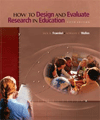Jack R. Fraenkel,
San Francisco State University
Norman E. Wallen,
San Francisco State University
| Biographical study | A form of qualitative research in which the researcher works with the individual to clarify important life experiences
|
 |
 |
 |
| Case study | An in-depth investigation of an individual, group, or institution to determine the variables, and relationship among the variables, influencing the current behavior or status of the subject of the study.
|
 |
 |
 |
| Foreshadowed problems | The problem or topic that serves, in a general way, as the focus for a qualitative inquiry.
|
 |
 |
 |
| Grounded theory study | A form of qualitative research which derives interpretations inductively from raw data with continual interplay between data and emerging interpretations.
|
 |
 |
 |
| Holistic perspective | The attempt to incorporate all aspects of a culture into an ethnographic interpretation.
|
 |
 |
 |
| Instrumental case study | One that focuses on a particular individual or situation with little effort to generalize.
|
 |
 |
 |
| Intrinsic case study | One that attempts to generalize beyond the particular case.
|
 |
 |
 |
| Mixed-method designs | A study combining quantitative and qualitative methods.
|
 |
 |
 |
| Natural setting | A specific place in which events and interactions among individuals typically occur.
|
 |
 |
 |
| Positivism | A philosophic viewpoint emphasizing an 'objective' reality which includes universal laws governing all things including human behavior.
|
 |
 |
 |
| Qualitative research | Research in which the investigator attempts to study naturally occurring phenomena in all their complexity.
|
 |
 |
 |
| Replication | Refers to conducting a study again; the second study may be a repetition of the original study, using different subjects, or may change specified aspects of the study.
|



 2003 McGraw-Hill Higher Education
2003 McGraw-Hill Higher Education